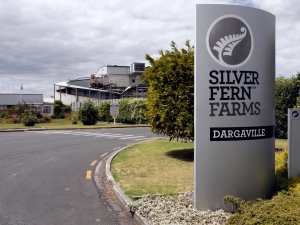China’s new beef tariffs expected to favour New Zealand exporters
Additional tariffs introduced by the Chinese Government last month on beef imports should favour New Zealand farmers and exporters.
 For beef farmers SFF’s scope 3 Forest, Land and Agriculture (FLAG) intensity target is 24% reduction by 2033 – from a 2023 baseline.
For beef farmers SFF’s scope 3 Forest, Land and Agriculture (FLAG) intensity target is 24% reduction by 2033 – from a 2023 baseline.
Meat exporter Silver Fern Farms Ltd has told farmer suppliers that its proposed scope 3 emissions reduction targets won’t pick on individual farms.
In an email to suppliers, chief executive Dan Boulton said they aren’t mandating suppliers, who are members of Silver Fern Farms co-operative, to meet certain emissions reductions.
“As we outlined throughout our recent roadshows, we are setting Scope 3 emissions reductions targets for Silver Fern Farms. These new targets apply to both on-farm and supply chain emissions and are in addition to our existing Scope 1 and 2 targets.
“Let me start with an important point first: we are not setting targets for individual farms,” Boulton says.
For beef farmers SFF’s scope 3 Forest, Land and Agriculture (FLAG) intensity target is 24% reduction by 2033 – from a 2023 baseline. For sheep farmers, the absolute target is 10% reduction by 2033- again from a 2023 baseline. No target has been set for venison farmers. SFF says it will be working with these suppliers to measure and manage emissions.
Boulton says this is about an organisational-level target, collaboration, and continuing to position Silver Fern Farms and suppliers to lead the world in profitable, Nature Positive food production.
“Many of our larger high-value customers have already, or are about to, adopt their own Scope 3 emissions reduction targets. These customers are required to demonstrate action towards emissions reduction within their full supply chain, which include Silver Fern Farms and their suppliers.”
Boulton notes that many suppliers are telling them that they have already been implementing changes on farm to improve their efficiency.
He adds that these suppliers want a platform that enables SFF to recognise the gains they are making and link this progress through to in-market reward.
“Continuing New Zealand farmers’ track record of efficiency gains and environmental progress creates an opportunity with these customers that we must grab. Setting our own Scope 3 emissions reduction targets creates a pedestal to celebrate our farming system on a global stage and position our farmers as trusted Nature Positive food producers.”
Boulton told farmers that these opportunities aren’t theoretical.
“Towards the end of this year, a major high-value US retailer has signed up Silver Fern Farms to be their grass-fed beef supplier and we have more commercial arrangements with other major retailers imminent. These opportunities have been realised through our leadership and authenticity on sustainability.
“Our customers are willing to invest in new ways of achieving our collective targets, and we are in a unique window of time to capitalise on these opportunities. However, they expect us to adhere with international best practice, provide detailed ways through which we can influence sustainable supply, and to set out tangible emissions reduction pathways.”
Boulton describes achieving the targets as “a collaborative process”.
“We know our suppliers continue to make farming decisions that result in greater efficiency gains. A key focus from this work is continuing to capture better data and building proof points of the efficiency gains we are making.
“By capturing better data and reporting real emissions reductions, we can link suppliers through the markets signals we are seeing.”
Boulton says SFF will also continue to invest through Agrizero to find options for mitigation technologies that are acceptable to farmers and consumers.
“We want to continue working with you to understand any barriers to uptake of any new technologies and how we can incentivise these on farm,” Boulton told farmer suppliers.
Controls on the movement of fruit and vegetables in the Auckland suburb of Mt Roskill have been lifted.
Fonterra farmer shareholders and unit holders are in line for another payment in April.
Farmers are being encouraged to take a closer look at the refrigerants running inside their on-farm systems, as international and domestic pressure continues to build on high global warming potential (GWP) 400-series refrigerants.
As expected, Fonterra has lifted its 2025-26 forecast farmgate milk price mid-point to $9.50/kgMS.
Bovonic says a return on investment study has found its automated mastitis detection technology, QuadSense, is delivering financial, labour, and animal-health benefits on New Zealand dairy farms worth an estimated $29,547 per season.
Pāmu has welcomed ten new apprentices into its 2026 intake, marking the second year of a scheme designed to equip the next generation of farmers with the skills, knowledge, and experience needed for a thriving career in agriculture.

OPINION: Here w go: the election date is set for November 7 and the politicians are out of the gate…
OPINION: ECan data was released a few days ago showing Canterbury farmers have made “giant strides on environmental performance”.